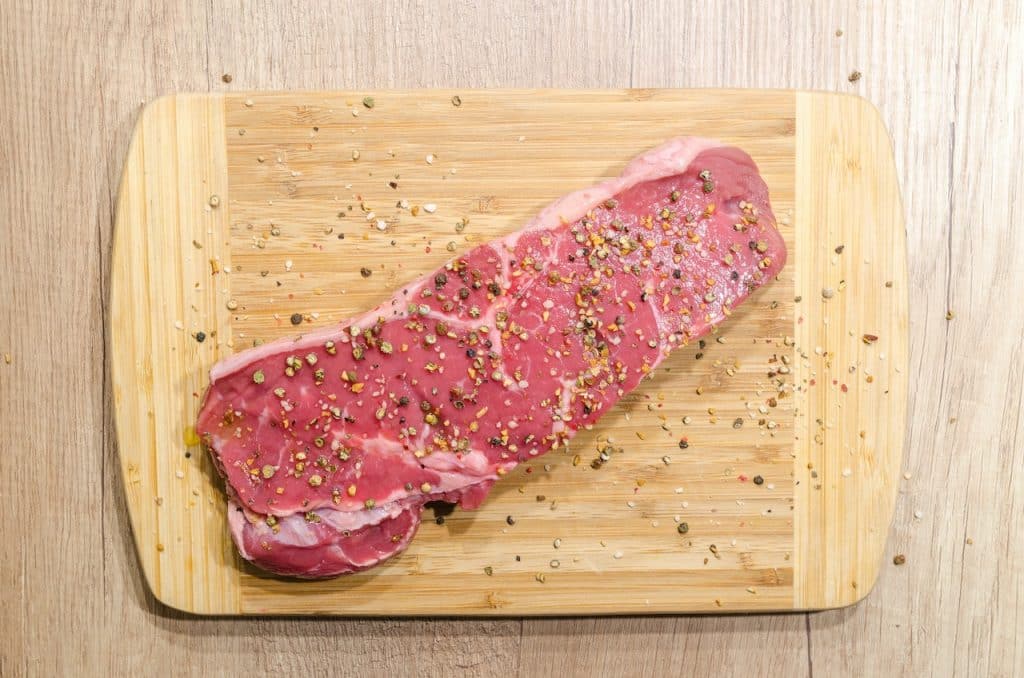The ketogenic diet, also known as the keto diet, is a low-carb, high-fat diet that has gained popularity in recent years as a weight loss and health improvement approach. One of the key aspects of following the keto diet is understanding the macronutrient content of the foods you eat and choosing those that align with the high-fat, low-carb requirements of the diet. Beef jerky, a popular snack food, is often considered by keto dieters as a potential option. However, the keto-friendliness of beef jerky can be a matter of debate due to its varying nutritional content and ingredients.
In this post, we will provide a detailed overview of the nutritional content of beef jerky and explore its advantages and disadvantages for those following a ketogenic diet. We will also offer recommendations for those looking to include beef jerky in their keto-friendly food choices.
What is Beef Jerky?

Beef jerky is a dried, cured, and seasoned meat snack that is typically made from lean cuts of beef, such as flank steak, sirloin, or round. The meat is sliced into thin strips, marinated in a blend of spices and seasonings, and then dried or dehydrated in a low-heat oven or dehydrator. The result is a chewy, flavorful, and protein-rich snack that can be stored for several months without refrigeration.
Beef jerky has been around for thousands of years, with evidence of dried meat being consumed by ancient civilizations, such as the Native Americans and the ancient Egyptians. It was a popular food source for travelers and hunters, as it was easy to transport and provided a source of protein and energy on long journeys. Today, beef jerky continues to be a popular snack food and is widely available in supermarkets and specialty stores.
Popular Brands and Variations
There are many different brands and variations of beef jerky available on the market today. Some popular brands include Jack Link’s, Oberto, and Field Trip. Variations of beef jerky include teriyaki, spicy, honey pepper, and original flavor. There are also alternative types of jerky, such as turkey, chicken, and venison jerky, that offer a similar taste and texture to traditional beef jerky.
Nutritional Content of Beef Jerky
Macronutrients (Protein, Fat, Carbohydrates)
Beef jerky is typically high in protein and low in carbohydrates, making it an attractive snack option for those following a ketogenic diet. A 100-gram serving of beef jerky can contain up to 25 grams of protein and just 2 grams of carbohydrates. The amount of fat in beef jerky varies, but it is typically low to moderate.
Micronutrients (Vitamins and Minerals)
Beef jerky is a good source of several essential vitamins and minerals, including iron, zinc, and B vitamins. It can also provide small amounts of potassium, magnesium, and phosphorus.
Sodium Content
One potential concern for those following a ketogenic diet is the high sodium content of beef jerky. A 100-gram serving of beef jerky can contain up to 1500 mg of sodium, which is more than half of the recommended daily intake. Excessive sodium intake can raise blood pressure and lead to dehydration.
Sugars and Artificial Sweeteners
Some brands of beef jerky may contain added sugars or artificial sweeteners, which can negatively impact the keto-friendliness of the snack. It is important to read labels carefully and choose a brand that is low in added sugars and artificial sweeteners, or opt for a brand that uses natural sweeteners, such as honey or stevia.
Factors that Determine Keto-Friendliness of Beef Jerky

Type of Meat Used
The type of meat used to make beef jerky can impact its keto-friendliness. Opt for lean cuts of beef, such as sirloin or flank steak, to ensure that the jerky is low in fat and high in protein. Avoid jerky made from processed meats, such as hot dogs or sausages, as they may contain added carbohydrates and chemicals that can negatively impact the keto-friendliness of the snack.
Processing Method
The processing method used to make beef jerky can also impact its keto-friendliness. Some processing methods may result in the addition of sugar or other carbohydrates, which can increase the carbohydrate content of the jerky. Choose a brand that uses minimal processing and minimal added ingredients to ensure that the jerky is as keto-friendly as possible.
Added Ingredients
As mentioned earlier, some brands of beef jerky may contain added sugars, artificial sweeteners, or other ingredients that can negatively impact the keto-friendliness of the snack. Read labels carefully and choose a brand that uses natural sweeteners, such as honey or stevia, or that does not contain added sugars or artificial sweeteners.
Serving Size
The serving size of beef jerky can also impact its keto-friendliness. Be mindful of portion control and choose a serving size that fits within your daily carbohydrate limit. A serving size of 1-2 ounces (28-57 grams) is typically appropriate for those following a ketogenic diet.
Advantages and Disadvantages of Beef Jerky for the Keto Diet
A. Advantages
- High in Protein: Beef jerky is an excellent source of protein, making it an ideal snack for those following a ketogenic diet. The high-protein content can help support muscle mass and repair and can also keep you feeling full and satisfied for longer periods of time.
- Low in Carbohydrates: Beef jerky is also low in carbohydrates, which is an important consideration for those following the ketogenic diet. By choosing a low-carb snack option like beef jerky, you can stay within your daily carbohydrate limit and maintain ketosis.
- Convenient and Portable: Beef jerky is easy to pack and take on the go, making it a convenient and portable snack option for busy lifestyles. It is also shelf-stable, so you don’t have to worry about refrigeration or spoilage.
- Flavorful and Satisfying: Beef jerky has a bold, savory flavor that can be satisfying and enjoyable as a snack.
Disadvantages
- High Sodium Content: As mentioned earlier, beef jerky can be high in sodium, which can be a disadvantage for those following a ketogenic diet. Excessive sodium intake can lead to dehydration, increase blood pressure, and disrupt the balance of electrolytes in the body.
- Added Sugars and Artificial Sweeteners: Some brands of beef jerky may contain added sugars or artificial sweeteners, which can negatively impact the keto-friendliness of the snack.
- Processed Ingredients: Beef jerky is often made with processed ingredients, including preservatives, artificial flavors, and chemicals. These additives can negatively impact overall health and wellness and may not align with a whole-foods-based approach to the ketogenic diet.
Recommendations for Keto Dieters
Choose Beef Jerky Made with Lean Cuts of Meat
Opt for beef jerky made with lean cuts of meat, such as sirloin or flank steak, to ensure that the jerky is low in fat and high in protein. Avoid jerky made from processed meats, such as hot dogs or sausages, as they may contain added carbohydrates and chemicals that can negatively impact the keto-friendliness of the snack.
Read Labels Carefully for Added Ingredients
Read labels carefully and choose a brand of beef jerky that uses minimal processing and minimal added ingredients. Avoid brands that contain added sugars, artificial sweeteners, or other ingredients that can negatively impact the keto-friendliness of the snack.
Limit Sodium Intake
Beef jerky can be high in sodium, so it is important to limit sodium intake to maintain the balance of electrolytes in the body. Choose a brand of beef jerky that uses minimal added salt or opt for unsalted varieties.
Choose Jerky with Low or No Sugars and Artificial Sweeteners
Choose a brand of beef jerky that uses natural sweeteners, such as honey or stevia, or that does not contain added sugars or artificial sweeteners. This will help you maintain a low-carbohydrate diet and stay within your daily carbohydrate limit.
Consider Making Homemade Beef Jerky
Consider making your own beef jerky at home using lean cuts of meat, natural sweeteners, and minimal added ingredients. This can be a cost-effective and health-conscious alternative to store-bought varieties, and can also allow you to control the sodium and carbohydrate content of the jerky.
Net Carb Calculator for Beef Jerky
To calculate the net carbs in beef jerky, you need to subtract the fiber and sugar alcohols from the total carbohydrates. Here’s a simple formula to help you:
Net Carbs = Total Carbohydrates – Fiber – Sugar Alcohols
Here’s an example calculation for a serving of beef jerky (30g) with the following nutrition information:
- Total Carbohydrates: 3g
- Fiber: 1g
- Sugar Alcohols: 1g
- Net Carbs = 3g – 1g – 1g = 1g
In this example, the serving of beef jerky has 1g of net carbs, making it a suitable snack option for those following a ketogenic diet. However, it is important to check the nutrition information for each brand of beef jerky, as the net carbs can vary based on the added ingredients and processing methods.
Conclusion
Beef jerky can be a keto-friendly snack option for those following a low-carbohydrate, high-protein diet. Key factors that determine the keto-friendliness of beef jerky include the type of meat used, the processing method, added ingredients, and serving size. Keto dieters should choose beef jerky made with lean cuts of meat, read labels carefully for added ingredients, limit sodium intake, choose jerky with low or no sugars and artificial sweeteners, and consider making homemade beef jerky.
In conclusion, beef jerky can be a convenient and satisfying snack option for those following a ketogenic diet. However, it is important to choose a high-quality, keto-friendly variety and to be mindful of portion control and added ingredients. By following these recommendations, you can incorporate beef jerky into your ketogenic diet and enjoy a tasty, protein-rich snack that supports your dietary goals.
Frequently Asked Questions
Is all beef jerky keto-friendly?
Not all beef jerky is keto-friendly. It is important to choose a high-quality, minimally processed beef jerky that is made with lean cuts of meat and does not contain added sugars, artificial sweeteners, or other ingredients that can negatively impact the keto-friendliness of the snack.
What type of beef should I look for in a keto-friendly jerky?
Look for beef jerky made with lean cuts of meat, such as sirloin or flank steak, to ensure that the jerky is low in fat and high in protein. Avoid jerky made from processed meats, such as hot dogs or sausages, as they may contain added carbohydrates and chemicals that can negatively impact the keto-friendliness of the snack.
How much sodium should I look for in a keto-friendly jerky?
Beef jerky can be high in sodium, so it is important to limit sodium intake to maintain the balance of electrolytes in the body. Choose a brand of beef jerky that uses minimal added salt or opt for unsalted varieties.
Are there any sweeteners I should avoid in keto-friendly jerky?
Choose a brand of beef jerky that uses natural sweeteners, such as honey or stevia, or that does not contain added sugars or artificial sweeteners. This will help you maintain a low-carbohydrate diet and stay within your daily carbohydrate limit.
What is the net carbohydrate content of beef jerky?
To calculate the net carbohydrates in beef jerky, subtract the fiber and sugar alcohols from the total carbohydrates. The net carbohydrate content can vary based on the added ingredients and processing methods, so it is important to check the nutrition information for each brand of beef jerky.

Meet Yasir here! As a blogger for over six years, my passion has never faded. I love writing in a variety of niches including weight loss and Keto Diet. I am an enthusiastic blogger and writing geek. I am known for honest product reviews and am always looking for the latest and greatest technology. I have been blogging for over six years, and my articles are featured on some of the top websites. When I am not writing, I spend time with my family or working on my next big project. Cheers!








